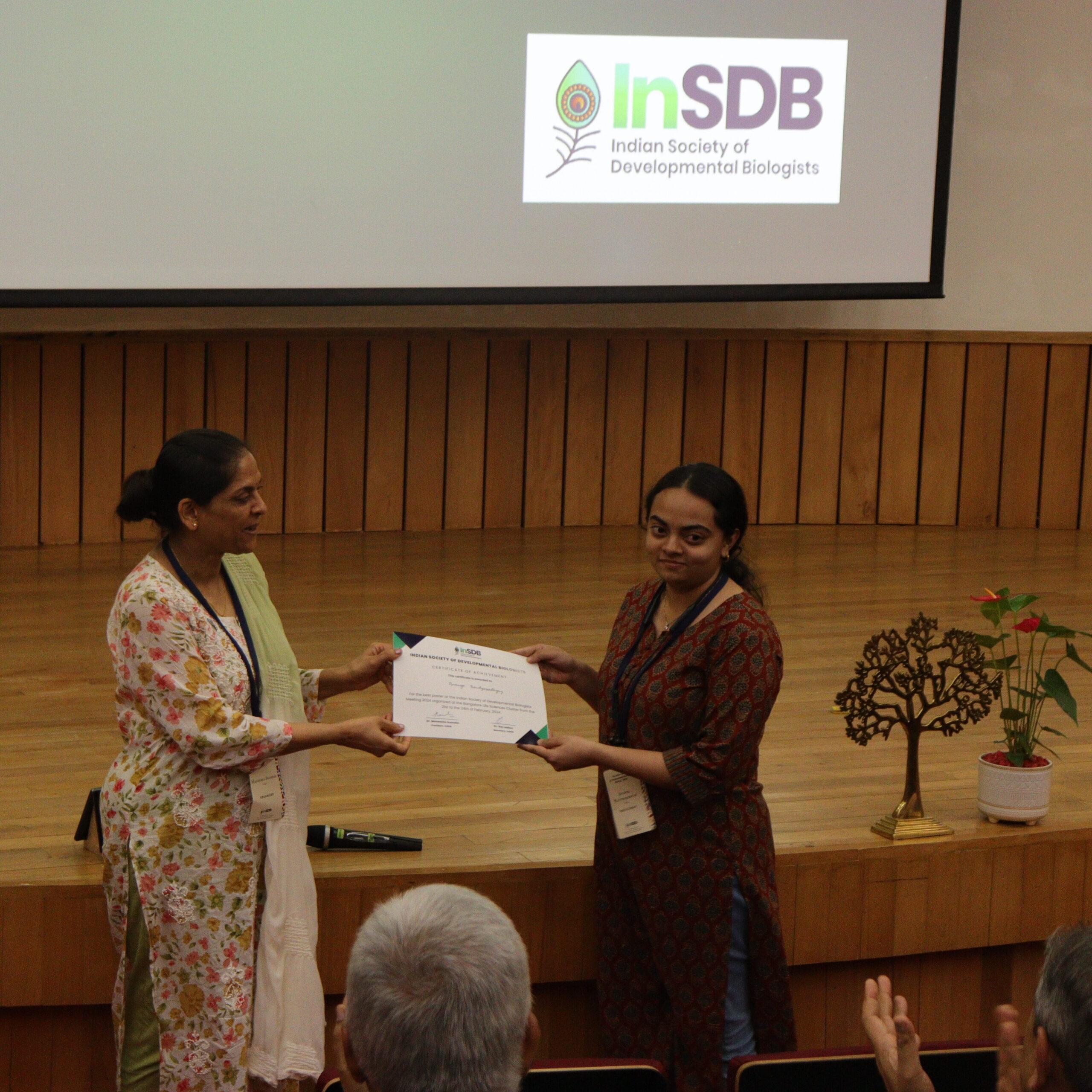An integrated PhD student in Dr. Abhishek Bhattacharya’s lab at NCBS, Ananya Bandyopadhyay shares the work behind her prize-winning poster and about InSDB24.

1. Tell us a bit about the research presented in your winning poster
We know that neuronal communication is important for the functioning of the brain and this is majorly mediated by synaptic communication. Electrical synapses are one such mode of synaptic communication. They are clusters of gap junction channels that allow direct cell-to-cell communication between two neurons. These synapses can be regulated at different levels such as their stereotypic localization, rectification, voltage gating, etc. which suggests that along with the intrinsic property of the channel, there could be multiple players that are involved in these processes. There is evidence of some such proteins in the literature. However, it remains understudied. Knowing this, we are profiling the electrical synapse-interacting proteins by an unbiased biochemical screen.
2. So, you’re using a blind screen to identify proteins that interact with electrical synapses – have you found any interesting candidates so far?
Yes! Preliminary results and ongoing work from the screen have identified proteins from different families that function as chaperones, protein-modifying enzymes, and molecular scaffolds. Additionally, some proteins have been found to localize in subcellular organelles, including mitochondria. We are currently beginning to characterize some candidate proteins picked up by the screen through microscopic, genetic, and behavioral tools.
2. Great! What drew you to this topic for your research?
At this stage, this project is just beginning to identify some molecular players that may be involved in aspects of electrical synapse functioning. However, on a broader scale, it looks at a critical component of neuronal functioning that is still somewhat of a mystery when compared to other modes of neuronal communication. By identifying the molecular players involved, this study sets the stage to answer some questions about the basic mechanisms underlying the functioning and regulation of electrical synapses. I have always been interested in fundamental cell biology and intrigued by how complex processes in biology can be intricately regulated, so this is something I was excited to get into.
3. On a more personal level, what’s the one thing about your project that keeps you excited?
Since I am still in the beginning stages of my project, everything seems exciting! Having said that, a lot in the field remains unknown and what keeps me excited is the prospect of being able to significantly contribute to it by understanding some key components of electrical synapse biology.
4. I am sure as someone in the early stages of PhD, you must’ve loved to see some amazing research at the conference. Among the many posters that were presented at InSDB24, which one intrigued you the most?
There were many interesting posters at the conference but the one by Vidyanand Sasidharan really caught my attention. The study was about understanding the mechanism of regeneration at the site of injury in Planaria. While trying to study this, they show the presence of extracellular vesicles carrying small regulatory RNAs that travel to the site of injury. They now propose to use these EVs as a way to study cellular communication. I vividly remember how attending that poster made me realize that the observations one has while answering one specific question in biology may be repurposed in a completely different direction and all it requires is for one to think from different perspectives.
5. What was the most exciting part of participating in the conference?
The most exciting part was getting to interact and hear from people coming from different parts of the world, but trying together to do important science. Listening to the talks and posters iterated the fact that there are multiple ways to approach a problem and how each of those together improves the understanding of a field. Also, it is always a good experience to get feedback from more experienced scientists and InSDB24 allowed me to do so.
6. Glad to hear the conference left you inspired. What are your future plans?
It is still too early to think of anything beyond my PhD but I would definitely want to stay in academia and do good science.
Congratulations, Ananya, and all the best for your PhD journey!





